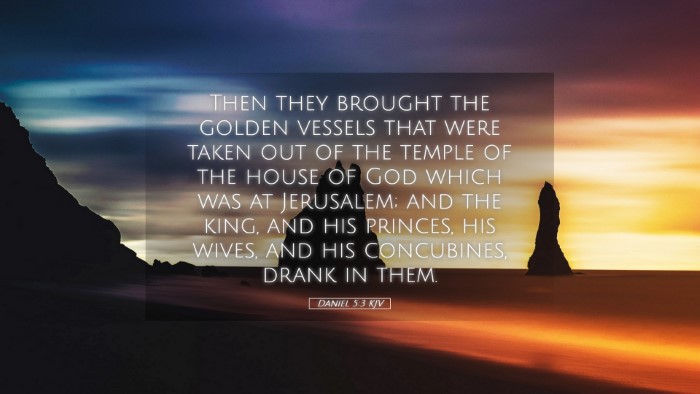Commentary on Daniel 5:3
Daniel 5:3 states, "Then they brought the golden vessels that were taken out of the temple of the house of God which was at Jerusalem; and the king, and his princes, his wives, and his concubines, drank in them."
Context and Background
The context of this chapter is crucial to understanding its implications. The events unfold during the reign of King Belshazzar of Babylon, a time marked by decadence and moral decline. Belshazzar’s use of sacred vessels from the Jerusalem temple demonstrates not only contempt for God but also a profound misunderstanding of his own position.
Commentary Insights
Matthew Henry's Commentary
Matthew Henry emphasizes that the act of drinking from the sacred vessels is a sign of Belshazzar's pride and blasphemy. He notes that the vessels were meant for divine worship, and their profanation signifies a turning away from God’s covenant. Henry observes that this act of sacrilege is not just a moment of indulgence but a conscious rebellion against the holiness of God. This reflects the heart of humanity in its relentless quest to challenge divine authority.
Albert Barnes' Commentary
Albert Barnes elucidates how the king's actions reflect the broader theme of idolatry and disrespect towards divine symbols. He highlights that the drinking from these vessels signifies an acknowledgment of false gods and a rejection of the true God. Barnes also points out the gathering of not just the king but also his wives and concubines, which indicates a deliberate public display of rebellion against God. This serves as a reminder of the importance of private and public piety.
Adam Clarke's Commentary
Adam Clarke provides a perspective on the consequences of Belshazzar’s actions, noting that his actions invite divine judgment. Clarke stresses that using the sacred objects for common and profane purposes draws God's disfavor. This moment foreshadows the ensuing judgment that leads to the fall of Babylon, illustrating how the misuse of sacred authority inevitably leads to downfall. Clarke underscores the gravity of actions that seem trivial but hold deeper spiritual ramifications.
Theological Implications
The significant theological reflection derived from Daniel 5:3 involves the concept of holiness and the sacredness of worship. The usage of the temple vessels symbolizes a broader disregard for God’s holiness, and the narrative serves as a warning against the dangers of secularism infiltrating worship. When leaders and individuals prioritize personal pleasure over reverence, they risk severe consequences.
Reflections for Pastors and Theologians
This passage provides valuable insights for modern ministry. Pastors are called to remind their congregations of the sacredness of worship and the importance of honoring God in all aspects of life. The act of profaning sacred things is not confined to physical vessels but extends to how believers approach their faith and practices. It challenges ministers to ensure that worship remains centered on reverence and that the community recognizes the seriousness of divine things.
Lessons for Students and Scholars
Students and scholars can draw from this narrative rich theological themes addressing the nature of sin, judgment, and repentance. The commentary reveals that the repercussions of Belshazzar’s actions are a pivotal narrative illustrating divine sovereignty and the moral order established by God. Scholars are invited to engage with historical and cultural contexts to deepen their understanding of how similar attitudes may prevail in contemporary society.
Concluding Thoughts
The complexities of Daniel 5:3 invite all readers to reflect on their own reverence and relationship with the sacred. The collective insights from Matthew Henry, Albert Barnes, and Adam Clarke bring to light critical interpretations required for contemporary application. As we discern divine truth in this narrative, may we strive to honor God, keeping sacred what He has established and reminding ourselves that defiance comes with significant consequences.


